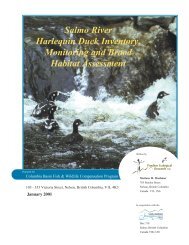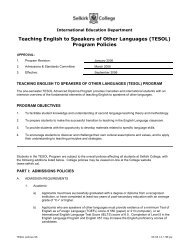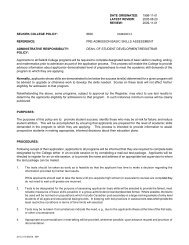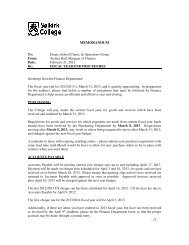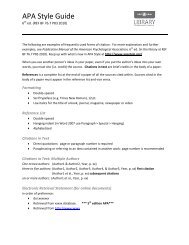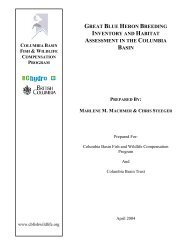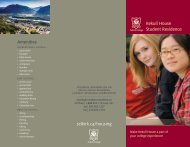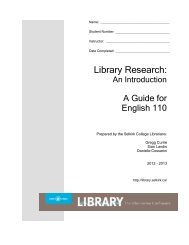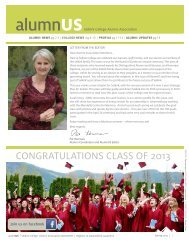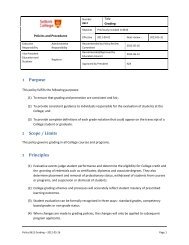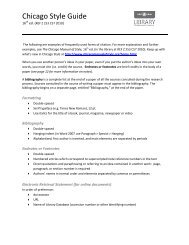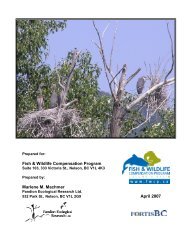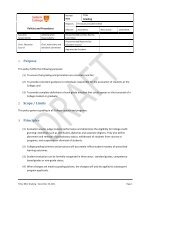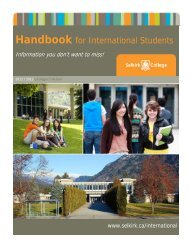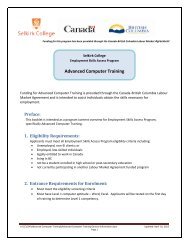selk irk.ca - Selkirk College
selk irk.ca - Selkirk College
selk irk.ca - Selkirk College
Create successful ePaper yourself
Turn your PDF publications into a flip-book with our unique Google optimized e-Paper software.
Music and technology, contemporary (Directed Studies)<br />
also uses audio and visual aids to explore different<br />
techniques and styles. A requirement in all majors,<br />
students have weekly assignments.<br />
Prerequisites<br />
MUSC 163.<br />
MUSC 268 Songwriting I<br />
This course is designed to help you prepare for<br />
survival in the competitive world of the songwriters<br />
market. Learn about all types of styles while<br />
striving to define your own. Special attention is<br />
paid to the rudiments of songwriting: creativity,<br />
basic theory (usage of basic rhythms, s<strong>ca</strong>les,<br />
harmony, melodic patterns, lyrics, etc.), basic<br />
styles (pop. rock, folk, country, etc.), production<br />
patterns, and the legalities of the music business.<br />
The class also spends time analyzing the work of<br />
other writers (successful and unsuccessful; those<br />
who have maintained artistic integrity; those who<br />
have not).<br />
Prerequisites<br />
A “B” or better in MUSC 171 and MUSC 175,<br />
and/or permission of the instructor.<br />
MUSC 274 Contemporary Harmony III<br />
This course continues with the principles of<br />
contemporary harmony as presented in CH II.<br />
Topics are expanded to include advanced minor<br />
key concepts, introduction to modal harmony<br />
and modal interchange, substitute dominant<br />
functions, basic chord s<strong>ca</strong>les for melodic<br />
considerations, advanced harmonic analysis and<br />
basic concepts of re-harmonization. This course<br />
provides students with a working knowledge of<br />
contemporary minor key and modal harmony<br />
and the ability to use them in all styles of popular<br />
music.<br />
Prerequisites<br />
MUSC 175.<br />
MUSC 280 Ear Training III<br />
This course continues to develop an aural<br />
perception of intervals, pitches, seventh chords,<br />
chord progressions, melodies and rhythms. The<br />
focus of this Semester is on minor and secondary<br />
dominant melodies and chord progressions.<br />
The rhythms explore sixteenth note syncopated<br />
rhythms as well as 6/8 and 5/4 meters.<br />
Prerequisites<br />
MUSC 181.<br />
MUSC 282 Film Scoring I<br />
This hands-on course focuses on TV and radio<br />
broad<strong>ca</strong>sting. Students are required to score<br />
themes and cues for various TV and radio shows<br />
using mostly electronic equipment along with one<br />
or two live musicians.<br />
Prerequisites<br />
MUSC 171; and/or permission of instructor.<br />
MUSC 284 Composition I<br />
This course is designed to improve the skills<br />
of composers by presenting a wide variety of<br />
compositional tools in styles ranging from Classi<strong>ca</strong>l<br />
to Jazz, Folk, Rock and Pop. By studying the<br />
recordings and scores of composers throughout<br />
history each student gains a musi<strong>ca</strong>l awareness<br />
that strengthens their own compositional process.<br />
Particular attention is paid to the ‘building blocks<br />
of a composition;’ the musi<strong>ca</strong>l elements such<br />
as melody, harmony and rhythm that are at the<br />
core of the creative process. In class performance<br />
and analysis of student compositions occurs on<br />
a weekly basis and midSemester and final assignments<br />
are recorded.<br />
Prerequisites<br />
MUSC 171 and 175, and/or permission of the<br />
Instructor.<br />
MUSC 288 Advanced MIDI<br />
Appli<strong>ca</strong>tions I<br />
This course is an applied study of the software<br />
and concepts used in the recording home studio<br />
environment. The primary focus of the course is<br />
in the use of Pro Tools LE for the self-recording<br />
musician. Topics include: mixing console appli<strong>ca</strong>tion,<br />
editing techniques, microphone technique,<br />
an introduction to effects processing for final<br />
mixing, auxiliary buss in the virtual mixing<br />
board, use of patch bay, outboard effects, and file<br />
maintenance.<br />
Prerequisites<br />
MUSC 161 with a “B” or better.<br />
TWC 266 Introduction to Techni<strong>ca</strong>l<br />
Writing and Communi<strong>ca</strong>tions<br />
A review of basic English skills with an introduction<br />
to general principles in written techni<strong>ca</strong>l<br />
communi<strong>ca</strong>tion and its appli<strong>ca</strong>tion to professional<br />
music. Classroom sessions focus on grammar,<br />
writing skills, oral presentation skills, and job<br />
search techniques.<br />
MUSC 251b Directed Studies/Mentorship<br />
A bi-monthly (every other week) 1/2 hour private<br />
tutorship is provided for all Directed Studies<br />
majors. Students will consult with their mentor<br />
on a consistent basis (for a total of six meetings<br />
per semester). Instruction is designed to increase<br />
student’s techni<strong>ca</strong>l, artistic, and musi<strong>ca</strong>l quality<br />
relating to final project goals, as pertaining to<br />
student’s project proposal and portfolio. The<br />
mentor may be changed, pending approval, on a<br />
semester basis.<br />
Prerequisites<br />
MUSC 250b, and must be enrolled in the<br />
Directed Studies Major.<br />
MUSC 253 Private Lesson IV A<br />
A weekly half-hour private instrumental or vo<strong>ca</strong>l<br />
lesson is provided for all Music Production, Composition,<br />
and General Music majors. Instruction<br />
is available on keyboard, woodwinds, saxophone,<br />
percussion, guitar, electric and acoustic bass, and<br />
voice. Lessons are designed to increase students’<br />
techni<strong>ca</strong>l and musi<strong>ca</strong>l abilities.<br />
Prerequisites<br />
MUSC 252.<br />
MUSC 259 Preceptorship II<br />
Students continue their immersion in a professional<br />
performing environment where they receive<br />
feedback not only from their instructor, but also<br />
from club owners, managers, and customers. In<br />
this class, students will e required to assume a<br />
leadership role within their ensemble. Upon successful<br />
completion, they will have increased their<br />
performance abilities in the areas of versatility,<br />
sound, sight-reading, and improvisation. Students<br />
will be able to function in a variety of professional<br />
engagements common to today’s music industry.<br />
Prerequisites<br />
MUSC 258Q.<br />
MUSC 262 Survey of<br />
Recording Techniques<br />
An introduction to recording principles and<br />
practices, this course is open to students whose<br />
major is not music production. Topics include a<br />
brief history of the multi-track recording studio,<br />
procedures of a recording studio, procedures of a<br />
recording session, fundamentals of microphones<br />
and audio effects.<br />
MUSC 265 Instrumental Lab IV<br />
This course is designed to help students develop<br />
instrumental skills. Grouped by instrument,<br />
students learn the fundamentals of reading, articulation,<br />
balance, dynamics, styles and technique as<br />
related to their particular instrument. This course<br />
is taught ‘instrument-in-hand’ and also uses audio<br />
and visual aids to explore different techniques and<br />
styles. A requirement in all majors, students have<br />
weekly assignments.<br />
Prerequisites<br />
MUSC 264.<br />
MUSC 269 Songwriting II<br />
This course is designed to strengthen your<br />
songwriting skills in every respect. Closer attention<br />
is paid to marketing skills, legal procedures,<br />
finding one’s personal niche in the music business<br />
(whether to focus on one’s own style, concentrate<br />
on writing tunes for other acts, or both;<br />
whether to go through a publisher or be your own<br />
publisher; etc.). Co-writing music will be explored<br />
(you put lyrics to someone else’s music; they put<br />
music to yours). In class time centers around the<br />
analysis of successful songwriters in every genre.<br />
84 Selk<strong>irk</strong> <strong>College</strong> 12/13 School of Digital Media and Music



